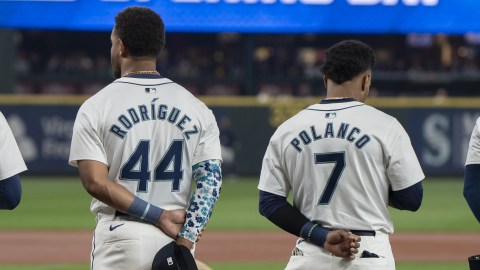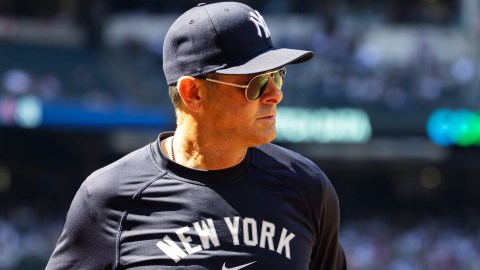 Derek Jeter’s career is something out of a movie.
Derek Jeter’s career is something out of a movie.
Jeter will tip his cap, head down the dugout steps and ride off into the sunset Sunday after 20 fascinating seasons in a New York Yankees uniform. It’s fitting his final moments on a Major League Baseball diamond will be spent against the Boston Red Sox at Fenway Park, a perfect side stage for Jeter’s evolution since he broke into the bigs in 1995.
There was a time in the late 1990s/early 2000s when Jeter entering Fenway was like Rocky Balboa entering Moscow. Sure, the rings on Jeter’s fingers suggested he was playing the role of Ivan Drago, taking down the Red Sox and everyone in the Yankees’ path. But there was such disdain in Boston for the “Evil Empire” that not hating — dare I say liking? — New York’s main character seemed unfathomable.
Anyone arriving at Fenway with “New York” emblazoned across his chest was fair game. If you were in the business of prolonging the Red Sox’s World Series drought — roughly 80 years and counting at the time — then you represented nothing more than a hurdle that must be cleared before any handshakes or head nods, figuratively speaking, could be exchanged.
The message was succinct yet vivid: Let’s not touch gloves. Let’s fight. I must break you.
Jeter was no exception, even if speaking ill of him wasn’t the preferred Yankees gripe. The kid won four World Series titles in his first five full seasons, while the Red Sox finished second in the American League East three times in that stretch. At age 26, Jeter had the world wrapped around his fingers in the form of championship bling. Giving credit where it was due seemed logical, but actually doing so teetered on the edge of treason, especially with Nomar Garciaparra battling with Jeter for shortstop supremacy.
“I remember coming here for the All-Star Game in ’99 and the car that was dropping us off pulled up to the wrong entrance,” Jeter recounted before Friday’s game at Fenway Park. “I got out of the car to walk into the stadium and I thought they were going to kill me.”
Boston’s 2004 World Series triumph, which allowed Red Sox fans to relent somewhat in their universal repulsion for all things Yankees, ushered in a new mindset. Perhaps it simply marked a transition from a closed mind to an open mind, as a championship-starved fan base finally could look beyond the “Curse of the Bambino,” the pinstriped dynasty and an all-too-familiar sinking feeling that the rug would be pulled out from underneath the Sox whenever a title seemed within reach.
There was more to baseball. And Jeter was someone to embrace, not despise.
The perception of Jeter began to change even before Keith Foulke snagged Edgar Renteria’s comebacker and flipped to Doug Mientkiewicz for the final out of the 2004 Fall Classic, though. On July 1 of that season, Jeter made a play at Yankee Stadium — since coined “The Dive” — that was nothing short of iconic, largely because of what it represented.
Trot Nixon hit a pop-up in the 12th inning. Jeter raced over into shallow left field with a full head of steam, only to end up in the third row after making a sensational catch as his worthy yet respected adversary, Garciaparra, looked on from the bench. Jeter emerged from the stands bruised and bloodied, a product of going toe-to-toe with his club’s most bitter rival.
The Yankees won that game in 13 innings, with Jeter’s head-first tumble serving as a picturesque moment that personified the captain’s win-at-all-costs mentality. Not hating — and yes, actually liking — Jeter became easier, even on Yawkey Way, because any other feeling would be rooted in nothing more than jealousy or denial. Jeter wasn’t some clean-cut prima donna driving George Steinbrenner’s money train; he was a passionate, respected baseball player leaving it all on the line in pursuit of eternal greatness.
There’s a scene in “Forgetting Sarah Marshall” when Jason Segel’s character, Peter Bretter, turns to Russell Brand’s character, Aldous Snow, while surfing and says, “(Expletive), you’re cool! It’s so hard to say, because, like, I hate you in so many ways.” The buildup for that interaction, of course, centered on Snow dating Bretter’s ex-girlfriend, Sarah Marshall, but it’s not unlike Jeter’s role in the Red Sox-Yankees rivalry.
For so long, Jeter had what Red Sox fans coveted more than anything — championships — and it created hesitance toward accepting the shortstop’s greatness. But as years passed and Jeter remained a consummate professional — all while still willing to relentlessly fight for his Yankees — it became time to accept his status as a living legend.
“I think after they won, it sort of — I don’t want to say they softened up, but I think they’ve become a little bit kinder,” Jeter said Friday of the Boston fans. “And thank you for that.”
Some players, you love to hate. And others, you hate to love. Jeter is someone worth loving to love for reasons that extend beyond the lines.
When Jeter emerges from the visitors’ clubhouse at Fenway Park on Sunday, he’ll be treated to a send-off unlike any ever experienced by a Yankee in Boston. The chants of “Rocky! Rocky! Rocky!” in Moscow won’t be able to hold a candle to the Fenway Faithful chanting, “De-rek Je-ter! (clap, clap, clap, clap, clap)” After all, if you can change, and I can change, everybody can change, right?
The Jeter script is nearing its end. And it’s a winner.
Photo via Mark L. Baer/USA TODAY Sports Images




